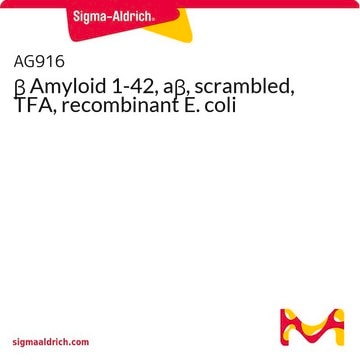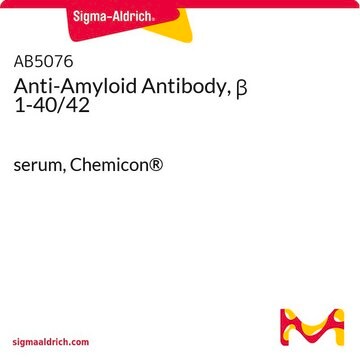PP69
β-Amyloid Peptide (1-42), Human
Synonim(y):
β-Amyloid Peptide (1-42), Human, DAEFRHDSGYEVHHQKLVFFAEDVGSNKGAIIGLMVGGVVIA
Zaloguj sięWyświetlanie cen organizacyjnych i kontraktowych
About This Item
Wzór empiryczny (zapis Hilla):
C203H312N56O59S
Masa cząsteczkowa:
4513.05
Kod UNSPSC:
12352202
NACRES:
NA.77
Polecane produkty
Próba
≥95% (HPLC)
Poziom jakości
Postać
lyophilized
nie zawiera
preservative
producent / nazwa handlowa
Calbiochem®
warunki przechowywania
OK to freeze
desiccated (hygroscopic)
rozpuszczalność
50 mM Tris-HCl, pH >9.0: ≤1 mg/mL
Warunki transportu
ambient
temp. przechowywania
−20°C
Opis ogólny
Wild-type, human Aβ1-42 peptide. A number of mutations, identified in the gene encoding the β-amyloid precursor protein (βAPP), have been linked to early-onset Familial Alzheimer’s Disease. Mutations in the genes encoding presenilin 1 and presenilin 2 have also been shown to alter the processing of βAPP, resulting in increased extracellular concentration of β-amyloid peptide Aβ1-42(43) relative to Aβ1-40. Biophysical and biochemical experiments suggest that Aβ1-42(43) may serve as a catalyst for the aggregation and deposition of β-amyloid peptide (Aβ) leading to neurotoxic effects associated with senile plaque formation. Furthermore, antibodies recog-nizing Aβ1-42 revealed that the long form of the peptide is increased in presenilin and βAPP mutants, while other studies have used Aβ specific antibodies to prevent the in vitro fibrillar aggregation of Aβ. Amino acid sequence verified by amino acid analysis or sequencing. This product is supplied in a form that is not neurotoxic prior to a preincubation step. The appearance of toxicity has recently been shown to correlate to the extent of β sheet structure. Useful for neurotoxicity studies and substrate cleavage assays.
Wild-type, human Aβ1-42 peptide. This product is supplied in a form that is not neurotoxic prior to a pre-incubation step. The level of toxicity has been shown to correlate to the extent of β sheet structure.
Immunogen
Human
Zastosowanie
Substrate Cleavage Assays (30-100 μg/ml)
Ostrzeżenie
Toxicity: Standard Handling (A)
Sekwencja
H-Asp-Ala-Glu-Phe-Arg-His-Asp-Ser-Gly-Tyr-Glu-Val-His-His-Gln-Lys-Leu-Val-Phe-Phe-Ala-Glu-Asp-Val-Gly-Ser-Asn-Lys-Gly-Ala-Ile-Ile-Gly-Leu-Met-Val-Gly-Gly-Val-Val-Ile-Ala-OH
Synthetic peptide corresponding to amino acid residues 1 - 42 of the processed human β-amyloid peptide.
Postać fizyczna
Supplied as a chloride salt.
Rekonstytucja
Reconstitute just prior to use. Do not store following reconstitution, as aggregation may occur.
Inne uwagi
Citron, M., et al. 1997. Nature Med.3, 67.
Hardy, J. 1997. Trends in Neurosci.20, 154.
Solomon, B., et al. 1997. Proc. Natl. Acad. Sci. USA94, 4109.
Duff, K., et al. 1996. Nature 383, 710.
Iwatsubo, T., et al. 1994. Neuron13, 45.
Suzuki, N., et al. 1994. Science264, 133.
Simmons, L.K., et al. 1994. Mol. Pharmacol.45, 373.
Hardy, J. 1997. Trends in Neurosci.20, 154.
Solomon, B., et al. 1997. Proc. Natl. Acad. Sci. USA94, 4109.
Duff, K., et al. 1996. Nature 383, 710.
Iwatsubo, T., et al. 1994. Neuron13, 45.
Suzuki, N., et al. 1994. Science264, 133.
Simmons, L.K., et al. 1994. Mol. Pharmacol.45, 373.
Informacje prawne
CALBIOCHEM is a registered trademark of Merck KGaA, Darmstadt, Germany
Kod klasy składowania
11 - Combustible Solids
Klasa zagrożenia wodnego (WGK)
WGK 1
Temperatura zapłonu (°F)
Not applicable
Temperatura zapłonu (°C)
Not applicable
Certyfikaty analizy (CoA)
Poszukaj Certyfikaty analizy (CoA), wpisując numer partii/serii produktów. Numery serii i partii można znaleźć na etykiecie produktu po słowach „seria” lub „partia”.
Masz już ten produkt?
Dokumenty związane z niedawno zakupionymi produktami zostały zamieszczone w Bibliotece dokumentów.
Klienci oglądali również te produkty
Nasz zespół naukowców ma doświadczenie we wszystkich obszarach badań, w tym w naukach przyrodniczych, materiałoznawstwie, syntezie chemicznej, chromatografii, analityce i wielu innych dziedzinach.
Skontaktuj się z zespołem ds. pomocy technicznej


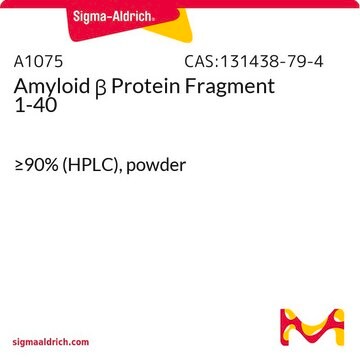
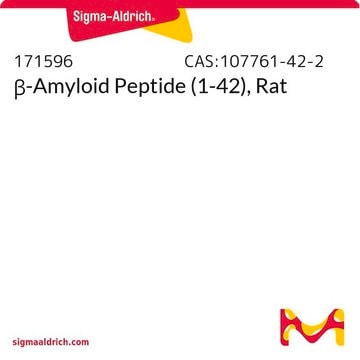
![[Ala28]-Amyloid β 25-35 ≥95% (HPLC)](/deepweb/assets/sigmaaldrich/product/images/306/938/dd9f7c72-cfca-4ea3-8e10-a7a2a7994639/640/dd9f7c72-cfca-4ea3-8e10-a7a2a7994639.jpg)

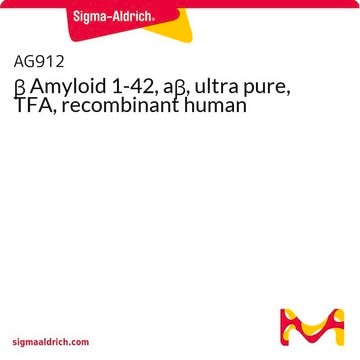
![[Gly22]-Amyloid β 1-42 Arctic human](/deepweb/assets/sigmaaldrich/product/images/222/254/58bfa018-4218-48a8-957d-f4d67366a533/640/58bfa018-4218-48a8-957d-f4d67366a533.jpg)
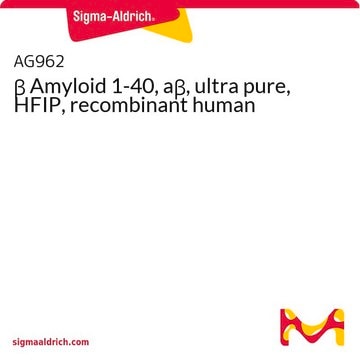
![[Gln22]-Amyloid β 1-40 human ≥95% (HPLC)](/deepweb/assets/sigmaaldrich/product/images/707/874/59f84b84-17c2-494f-b2ae-4ca860b83976/640/59f84b84-17c2-494f-b2ae-4ca860b83976.jpg)
